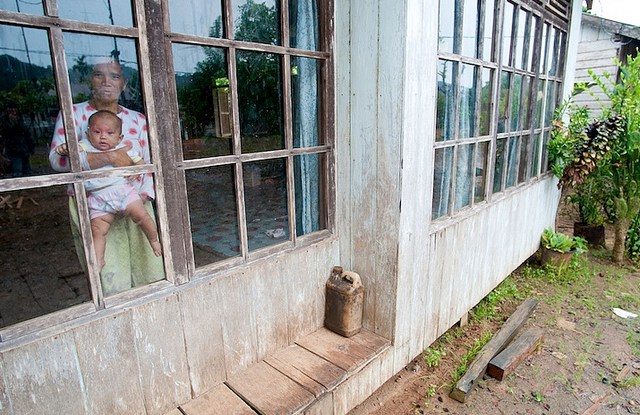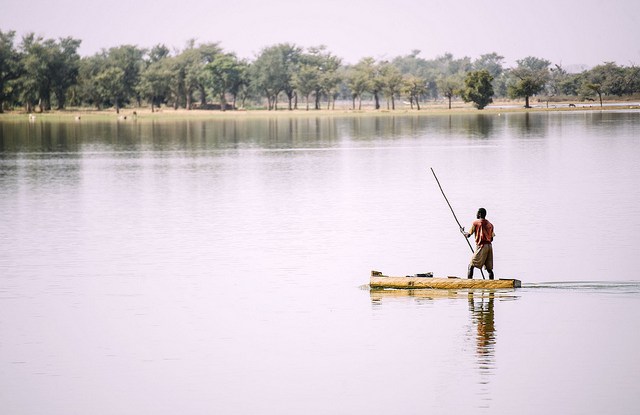
MONTPELLIER, France — As scientists and policymakers explore ways of making social and environmental systems more able to withstand shocks, there are growing concerns that existing inequality and power imbalances may be reinforced in the process, research presented at a recent conference suggests.
“I’m afraid resilience becomes politically motivated into an instrument to make the powerful more powerful. It should be an instrument to do the opposite,” said Luca Alinovi, an economist with the United Nations Food and Agriculture Organization (FAO), at the Resilience 2014 conference in Montpellier, France.
Resilience science studies how socio-ecosystems react to change and how much it takes to shift over a tipping point from one stable state to another.
Much of that research at the global level has focused on the Earth’s ability to support human societies within a range of “planetary boundaries” such as climate change, biodiversity loss and water consumption.
“Resilience science looks more and more like a map of tipping points linked to climate change,” said Johan Rockström, the executive director of the Stockholm Resilience Centre and lead author of the original 2009 publication on planetary boundaries.
Yet a growing body of research argues that such boundaries should be counterbalanced by the minimum social provisions to be met if people’s basic rights — such as access to sufficient food and water — are to be respected.
“The challenge for humanity is to build pathways that enhance sustainability and resilience by integrating environmental integrity with social equality, human rights, well-being and security,” said Melissa Leach, director of the Institute of Development Studies at the University of Sussex. “Questions of politics and of power need to be far better integrated into the conceptual apparatus we are looking at around planetary and social boundaries,” she added.
Leach argues that the current trend to seek “techno-scientific” fixes to tread this fine line suits the corporations, scientists and governments interested in promoting them, but neglects both the democratic need to involve citizens in the process and the opportunity to use solutions emerging from grassroots innovation.
“Some commentators are now alluding to the danger that planetary boundaries will become a form of top-down power grab that will end up proving quite anti-democratic,” she said.
WHEN CHANGE REINFORCES STATUS QUO
Policymakers, too, are concerned that helping societies become more resistant to shocks may reinforce undesirable power relations. “Do we need to build resilience in North Korea, or at this moment in the Central African Republic?” said Jean-Marc Châtaigner, who oversees development aid programs for the French Ministry of Foreign Affairs. “Resilience without democracy would be an absolute non-starter.”
Even when you target vulnerable groups, you need to ensure that beyond their representatives, the people are actually empowered
Recent field research has been highlighting those issues in forest landscapes around the world. Raffaele Vignola of the Centro Agronómico Tropical de Investigación y Educación (CATIE), a Costa Rica-based agricultural research institute, studies the involvement of local stakeholders in mitigation and adaptation programs across Latin America and is a partner scientist with the Center for International Forestry Research (CIFOR). He noted that the needs and interests of external agents interested in tackling climate change seldom match those of local communities, who are often excluded from technical discussions on the preparation of mitigation or adaptation action.
“What usually happens is that each is looking in a different direction and there is no meeting of meanings,” Vignola said. “The process needs to take into account power asymmetries in terms of knowledge ownership and how knowledge can be used in negotiations,” he warned.
In another example, Cecilia Viana, a geographer at the University of Brasilia and also a CIFOR partner scientist, examined how the Amazonian municipality of Paragominas had dropped off the list of areas named and shamed by the Brazilian government for their poor record on deforestation. While the leadership of the town’s mayor, support from the local trade union and financial resources from the mining industry were clearly identified in Paragominas’ transformation into a “green municipality,” Viana underlined the challenges facing government efforts to transpose its model elsewhere.
“Understanding of power relations within the municipality was incomplete. Change did not mean the same thing for a small or a big landholder. It reinforced existing power inequalities,” she said.
CIFOR scientists Houria Djoudi and Denis Gautier, who study the implementation of community forest management in Burkina Faso, have made similar findings: While decisions on land use in forest areas have been decentralized to local institutions, they have often reinforced existing power structures, often excluding groups such as migrants, pastoralists or women.
“Even when you target vulnerable groups, you need to ensure that beyond their representatives, the people are actually empowered,” Gautier said.
He and Djoudi cautioned against wholesale approaches of communities or even households as homogenous groups and insisted on the importance of individual strategies within them.
“We tend to neglect the communities as having their own power distribution,” Djoudi said.
For more information about the topics in this article, please contact Houria Djoudi at h.djoudi@cgiar.org.
We want you to share Forests News content, which is licensed under Creative Commons Attribution-NonCommercial-ShareAlike 4.0 International (CC BY-NC-SA 4.0). This means you are free to redistribute our material for non-commercial purposes. All we ask is that you give Forests News appropriate credit and link to the original Forests News content, indicate if changes were made, and distribute your contributions under the same Creative Commons license. You must notify Forests News if you repost, reprint or reuse our materials by contacting forestsnews@cifor-icraf.org.
